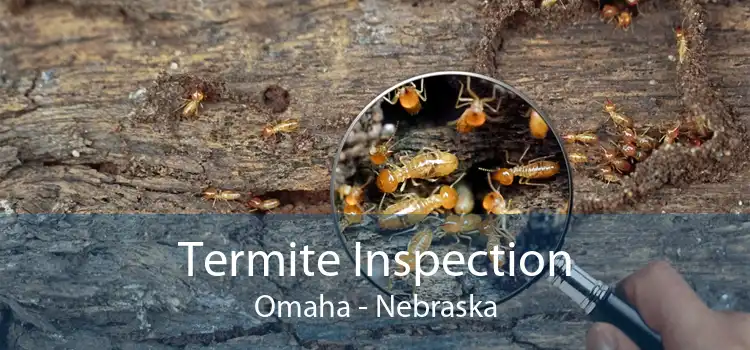Get the Best Termite Inspection in Omaha, NE With Termite Inspection Experts. Our Professional Termite Inspectors Offer Effective Termite Control And Treatment Services.
At All Day Pest Control Omaha, our team of termite inspection experts in Omaha, NE is dedicated to identifying and Eliminating Termite Infestations. Our trained professionals use specialized equipment, including moisture meters and thermal imaging cameras, to detect termite activity and assess the risk of future infestations. We inspect not only your property but also the surrounding area for potential sources of termite infestations. Count on us to provide comprehensive termite inspection services to keep your property safe.

Termite Inspection Services in Omaha, NE
Termite inspection services are performed by termite inspection professionals who are trained to identify and assess termite infestations. These Professional Termite Inspections are usually conducted on the basis to ensure that your home is free from termites and catching any potential infestations early on. During a termite inspection, the termite inspection professional in Omaha, NE will examine the exterior and interior of your home, looking for signs of termite activity. This may include checking for the presence of termite mud tubes, which are small tubes of mud that termites use to travel from the ground to the wood in your home. The All Day Pest Control Omaha Termite Inspection Experts in Omaha, NE will also look for any visible damage to the wood in your home, as well as any other signs of termite infestation. They will then provide a report detailing their findings and recommendations for treatment, if necessary.
Omaha Termite Inspections and Treatments
Termite inspections are an important part of protecting your home from termite damage. During a termite inspection, a termite inspection professional will examine your home for signs of termite infestation and assess the extent of the Termite Problem. If termites are found, the termite inspection professional in Omaha, NE will recommend a termite treatment plan to eliminate the infestation.
There are several methods for treating termites, including:
Pesticides: Pesticides can be applied to the soil around the foundation of the home to create a barrier that prevents termites from entering the structure.
Baiting Systems: Baiting systems are used to attract and kill termites. The baits contain a slow-acting poison that is carried back to the termite cluster, ultimately eliminating the entire population.
Physical Barriers: Physical barriers, such as metal screens or chemical barriers, can be installed around the foundation of the home to prevent termites from entering the structure.
Fumigation: Fumigation is a process in which a gas is released into the home to Kill Termites. This method is generally used for severe termite infestations from your home in Omaha, NE and requires the occupants of the home to vacate for a period of time.
It is important to work with a termite inspection professional to determine the Best Termite Treatment Plan for your specific situation. They will be able to assess the extent of the infestation and recommend the most effective treatment method.
What Does A Termite Inspector Do?
 A termite inspector is a trained termite inspection professional who specializes in identifying and assessing termite infestations. With a Thorough Termite Inspection, the All Day Pest Control Omaha termite inspector will completely examine the interior and exterior of your home and will find out the signs of termite activity. This may include checking for the presence of termite mud tubes, visible damage to wood, swarms of termites, and other signs of infestation. Once the termite inspection is complete, the inspector will provide a report detailing their findings and recommendations for Termite Treatment in Omaha, NE, if necessary. The report will outline the extent of the infestation and recommend a course of action to eliminate the termites and prevent future infestations.
A termite inspector is a trained termite inspection professional who specializes in identifying and assessing termite infestations. With a Thorough Termite Inspection, the All Day Pest Control Omaha termite inspector will completely examine the interior and exterior of your home and will find out the signs of termite activity. This may include checking for the presence of termite mud tubes, visible damage to wood, swarms of termites, and other signs of infestation. Once the termite inspection is complete, the inspector will provide a report detailing their findings and recommendations for Termite Treatment in Omaha, NE, if necessary. The report will outline the extent of the infestation and recommend a course of action to eliminate the termites and prevent future infestations.
How Much Does a Termite Inspection Cost?
The cost of a termite inspection can vary depending on several factors, including the size of your home, the age of your home, and the type of inspection being performed. It is important to keep in mind that the All Day Pest Control Omaha Cost Of A Termite Inspection in Omaha, NE is a small price to pay compared to the potential cost of repairing termite damage to your home. If you have any concerns about termites, it is always important to have a professional termite inspection to identify and address any termite problems.
How Often Should I Schedule A Termite Inspection?
It is usually recommended to schedule a termite inspection once a year. This is especially important if you live in an area that is prone to termite infestations, or if you have had termites in the past. However, even if you live in an area with a low risk of termite infestations, it is still important to have an Annual Termite Inspection in Omaha, NE to detect and resolve any problems early on. If you are buying a new home or have recently completed major renovations, it is also a good idea to have a termite inspection in Omaha, NE to make sure the property is free from infestations. Keep in mind that termites can cause significant damage to your home if they go undetected, so it is important to be proactive in identifying and treating any infestations.
What Does A Termite Inspection Consist Of?
 A termite inspection is a thorough examination of a property to identify and assess any termite infestations. During a termite inspection, the inspector will typically:
A termite inspection is a thorough examination of a property to identify and assess any termite infestations. During a termite inspection, the inspector will typically:
Examine the exterior of the property: The inspector finds out the presence of termite mud tubes that travel from the ground to the wood in the home. They will also check for any visible damage to the home, such as wood that appears to be thin or weakened.
Inspect the interior of the home: The All Day Pest Control Omaha termite inspector will check any visible signs of termite infestation inside the home, including damage to wood, termite droppings, and the presence of live termites.
Check the crawl space and attic: The All Day Pest Control Omaha termite inspector will examine the crawl space and attic (if accessible) for any signs of termite activity.
Provide a report: Once the termite inspection is complete, the inspector will provide a report detailing their findings and recommendations for treatment, if necessary.
How Long Does A Termite Inspection Take?
The length of a termite inspection can vary depending on the size of the property and the extent of the infestation. In general, a termite inspection in Omaha, NE for a typical single-family home can take anywhere from 30 minutes to several hours. A limited inspection, which is a Visual Termite Inspection of the home's exterior, including the foundation, crawl space, and any accessible areas of the home, can typically be completed in a shorter amount of time. A Full Termite Inspection, which is a more comprehensive examination of the home, including the interior and any accessible areas, such as the crawl space and attic, will generally take longer.
